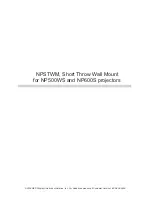
5
Removal and Cleaning
Remove the disposable wrap from the D-YS by peeling it away from the sensor. The sensor may be
surface-cleaned with a solution such as 70% isopropyl alcohol. If low-level disinfection is required, use
a 1:10 bleach solution. Do not use undiluted bleach (5%~5.25% sodium hypochlorite) or any cleaning
solution other than those recommended here because permanent damage to the sensor could occur.
CAUTION:
Do not expose connector pins to cleaning solution as this may damage sensor.
To clean or disinfect the sensor using the recommended wipe method:
1. Saturate a clean, dry gauze pad with the cleaning solution. Wipe all surfaces of the sensor
and the
cable with this gauze pad.
2. Saturate another clean, dry gauze pad with sterile or distilled water. Wipe all surfaces of the
sensor and cable with this gauze pad.
3. Dry the sensor and cable by wiping all surfaces with a clean, dry gauze pad.
To clean or disinfect the sensor using the recommended soak method:
1. Place the sensor in the cleaning solution, such that the sensor head(s) and desired length
of cable are completely immersed.
CAUTION:
Do not immerse the connector end of the cable as this may damage the sensor.
2. Dislodge air bubbles by gently shaking the sensor and cable.
3. Soak the sensor and the cable for 10 minutes.
4. Remove from cleaning solution.
5. Place the sensor and the cable in room temperature sterile or distilled water for 10 minutes.
6. Remove from the water.
7. Dry the sensor and cable by wiping all surfaces with a clean, dry gauze pad.
WARNINGS
1. Do not use the SpO
2
Sensor or other oximetry sensors during MRI scanning. Conducted
current may cause burns. Also, the sensor may affect the MRI image, and the MRI unit
may affect the accuracy of oximetry measurements.
2. If the sensor is misapplied with excessive pressure for prolonged periods, a pressure
injury can occur.
CAUTIONS
1. Failure to apply the SpO
2
Sensor properly may cause incorrect measurements.
2. Using the SpO
2
Sensor in the presence of bright lights may result in inaccurate
measurements. In such cases, cover the sensor with an opaque material.
3. Reusable sensors must be moved to a new site at least every 4 hours. Because individual skin
condition affects the ability of the skin to tolerate sensor placement, it may be necessary to
change the sensor site more frequently with some patients. If skin integrity changes, move
the sensor to another site.
Summary of Contents for Nellcor D-YS
Page 2: ...2 4 3 2 1...
Page 50: ...50 SpO2 4 SpO2 1 1 2 2 3 3 4 4 SpO2 1 3 3 15 15 40 40 5 4 6 7...
Page 51: ...51 Nellcor D YS 70 10 5 5 25 1 2 3 1 2 3 10 4 5 10 6 7...
Page 52: ...52 1 SpO2 2 1 SpO2 2 SpO2 3 4 Nellcor 5 6 7 8 9...
Page 54: ...54 Nellcor Nellcor Nellcor Covidien Covidien Covidien...
Page 56: ...56 SpO2 4 SpO2 1 1 2 2 3 3 4 4 SpO2 1 3 3 15 15 40 40 5 4 6 7 Nellcor...
Page 57: ...57 D YS 70 1 10 5 5 25 1 2 3 1 2 3 10 4 5 10 6 7 1 SpO2 MRI MRI 2 1 SpO2 2 SpO2...
Page 76: ...76 D YSPD SpO2 4 SpO2 1 1 2 2 3 3 4 4 SpO2 1 3 kg 3 15 kg 15 40 kg o...
Page 77: ...77 40 kg to 5 4 6 7 Nellcor D YS 70 1 10 5 5 25 1 2 3 1...
Page 78: ...78 2 3 10 4 5 10 6 7 1 SpO2 2 1 SpO2 2 SpO2 3 4 4 Nellcor 5 6...
Page 80: ...80 Nellcor Nellcor Nellcor Covidien Covidien Covidien...
Page 86: ...86 THIS PAGE INTENTIONALLY LEFT BLANK...






































